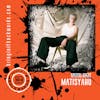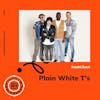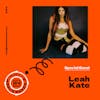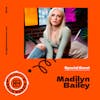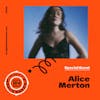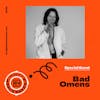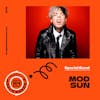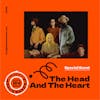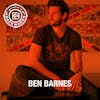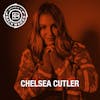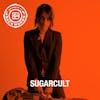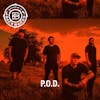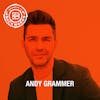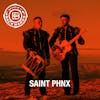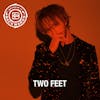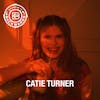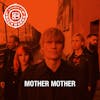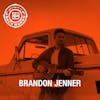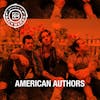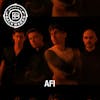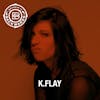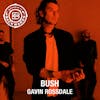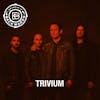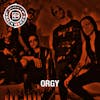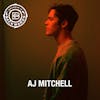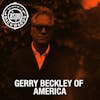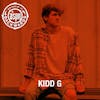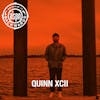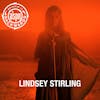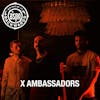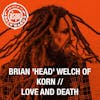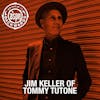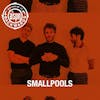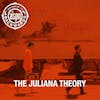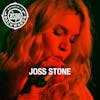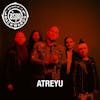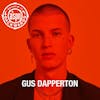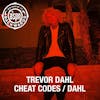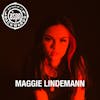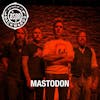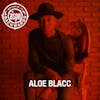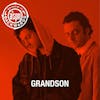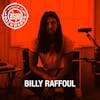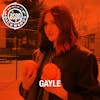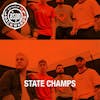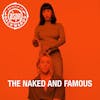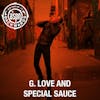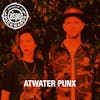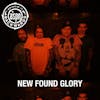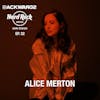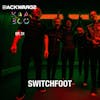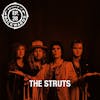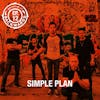Interview with Lo Moon
We had the pleasure of interviewing Matt Lowell of Lo Moon over Zoom video!
Known for delivering enticing and atmospheric soundscapes comprising ethereal guitar work, yearning lyrics, and resonant synths, Lo Moon are an alternative pop/rock outfit...
We had the pleasure of interviewing Matt Lowell of Lo Moon over Zoom video!
Known for delivering enticing and atmospheric soundscapes comprising ethereal guitar work, yearning lyrics, and resonant synths, Lo Moon are an alternative pop/rock outfit based in Los Angeles, California. Made up of frontman Matt Lowell (guitar/vocals), Crisanta Baker (synth/bass/samples), Sam Stewart (guitar), and Sterling Laws (drums), the group first appeared on the scene in the latter half of 2016, although the project had been evolving for many years prior. Lo Moon's self-titled debut album appeared in 2018 and charted in the Top Five of Billboard's Heatseekers chart, and the band returned in 2022 with sophomore their full-length, A Modern Life.
Around 2011, principal songwriter Lowell had begun planting the seeds of what would become the project’s first single, "Loveless." The track went through many changes in terms of lyrics, sound, and length. During this time, Lowell relocated from his native New York to Los Angeles, where he encountered Baker and Stewart, and Lo Moon became a collaborative effort. With Baker and Stewart's talents and input, "Loveless" wound up being a seven-minute epic that sprawling and transcended light and dark, both lyrically and aurally. After putting out the song online, it began to garner widespread attention and praise from the likes of Beats 1 Music and frontman Dougy Mandagi. Many also began to draw comparisons to fellow atmospheric acts with weighted songwriting under their belt -- from and to the and. However, the band decided to hold back in delivering further material and let "Loveless" stand as the sole representation of their sound for quite some time.
During this "hibernation period," the track's demo was eventually passed on to producer, and former guitarist. Impressed with the layered sound palette and the band's approach to the writing process, went on to help produce their debut album after they signed with. The activity was also rife outside of the studio, with the ensemble going on to open for, Muna, and, both in the U.S. and overseas. Lo Moon's eponymous debut full-length arrived in February 2018. The band's second single, "This Is It," charted in the Top Ten of Billboard's Adult Alternative Songs chart, and the album peaked at number four in the Heatseekers chart. Non-album single "For Me, It's You" appeared in 2018, and touring drummer Sterling Laws became a full-time bandmember later in the year. The band returned in 2021 with the single "Dream Never Dies," which made the Top 40 of the AAA chart. Lo Moon's second album, A Modern Life, appeared on in 2022. The band described the album as being about survival, and the struggle to find an identity.
We want to hear from you! Please email Tera@BringinitBackwards.com.
www.BringinitBackwards.com
#podcast #interview #bringinbackpod #LoMoon #AModernLife #Loveless #NewMusic #zoom
Listen & Subscribe to BiB
https://www.bringinitbackwards.com/follow/
Follow our podcast on Instagram and Twitter!
https://www.facebook.com/groups/bringinbackpod
We'd love to see you join our BiB Facebook Group.
Hello. It is Adam. Welcome back to bringing it backwards. A podcast where both legendary and rising artists tell their own personal stories of how they achieved stardom. On this episode, we had a chance to hang out with Matt of the band, lo moon, over zoom video. Matt was born and raised in long island, New York, and he talks about how he got into music. He actually really pursued a career in hockey, so he talks to us about that, but he started drumming at a very early age as well. He played drums starting at seven years old, did that up through high school. He joined a glee club. He talked about writing his first song. And the first song he really, really wrote was actually about nine 11 being from the New York area, seeing that happening in high school. At that time, we really actually both connected on that as far as being in high school and a half. And we're the same age. So I'm in San Diego, he's in New York. And how far apart, you know, we were as a country, but how everyone was still so struck at the same time, it was just, it was really interesting to hear him talk about that and writing that first song. He told us about going to Berkeley school of music. That's when he started his singer songwriter career, got to open up for some big acts, did some touring landed in New York city. And that's where he started to write what became the demos for the early lo moon stuff. He started Loveless when he was in New York city. He had some label interest in New York, moved to Los Angeles that kind of fell through. 1 (1m 52s): And this is where he starts to kind of form lo moon. He talked about getting signed to Columbia records, the huge success of the song, Loveless, how much it changed their career, you know, got on the radio. They're playing these big, big festivals. We talk about where they were when COVID happened and how that affected this brand new record, which Matt said was about 85% done coming into January, 2020 and how that affected the album and how it ended up turning out. The new record is called a modern life. Check that out and you can watch the interview with Matt and myself on our Facebook page and YouTube channel at bringing it backwards. It'd be awesome if you subscribe to our channel like us on Facebook, follow us on Instagram, Twitter, and Tik TOK at bringing back pod. 1 (2m 33s): And if you're listening to this on apple music or Spotify, we would love it. If you follow us there as well, and hook us up with a five-star review. I mean the world to us, 2 (2m 43s): We'd appreciate your support. If you follow and subscribe to our podcasts, wherever you listen to podcasts, 1 (2m 49s): We're bringing it backwards with low moon. This podcast is about you, you know, the origin story of low moon, and obviously the new record you guys have out well a week from tomorrow, 3 (3m 1s): From tomorrow. Crazy. 1 (3m 2s): Crazy. So cool. So first off, where were you born and raised 3 (3m 7s): Long island, New York in a town called oyster bay. We surveyed long island hometown of Billy Joel. That's kind of our claim to fame. 1 (3m 22s): I know there's a big music scene and, and the long island area 3 (3m 26s): There is. Yeah, there is long island. Punk scene was really, was really big when I was growing up and 1 (3m 34s): I to 3 (3m 35s): Was acidly massive. Yeah. Yeah. 1 (3m 39s): What was that like? I mean, did you go to what shows around there? 3 (3m 41s): Well, weirdly enough, I kind of, I left to go to a high school in Connecticut when, so I know I was, I was too busy playing sports, really? That, that was kind of, and I, and I had a lot of friends that were into the emo scene and I just, I just really didn't. How do you go to a lot of shows, but I became friends with Dan Niagara who was in a band called as tall as lines when I moved out to LA and he was like the, the main guy, you know, in the scene. 1 (4m 17s): <em></em> That's awesome. So long island you went to, you said you went to high school and Connecticut? 3 (4m 26s): I did. Yeah. 1 (4m 27s): Okay. But you were still living in long island community? 3 (4m 30s): I lived there. Yeah. Went to a boarding school. 1 (4m 32s): Oh, right on what was it? I mean, growing up in long island, how did you get into music? 3 (4m 37s): My dad was, was really into music. Ks. No, he doesn't have one musical bone in his body, but he, he has really good taste and he was just always showing me music. And at my middle school, there was a great little music program and I picked up drums first. 1 (4m 59s): Okay. How old are you when you did drums? 3 (5m 3s): I was seven. I still like, yeah, I got really into it and I, and, and I continued to play drums for a while. And then when I got to my sophomore year of high school was when I just started, you know, started to strum the guitar, tried to strum the guitar. 1 (5m 29s): Did you play in the school? Just 3 (5m 30s): Playing drums. 1 (5m 31s): Yeah. Were you in the school like band as a drummer? 3 (5m 35s): Yeah. And I was, well, we had this, it was, it was kind of like a contemporary music class. W it was bad. It was bad. My teacher absolutely hated me. I think I got kicked out because the hardest thing with drums and, and any, any, any instrument is the mind you're sat behind it. It's impossible not to play it. 1 (5m 57s): Right. You just like bang. 3 (6m 0s): He would start talking and I'd be like, you know, and I would just get kicked out all the time, but they liked my enthusiasm. I just always wanted to play. 1 (6m 11s): That's funny. Well, what, with that, you played an actual kid in the band at school. 3 (6m 16s): Yeah. It was like this. We had this weird contemporary band class and we had a full kit. I mean, it wasn't traditional band, which I thought, which I, I always found really interesting. Right. It was, it is, I was able to play the kit. I don't think there was enough kids that were in to be in band. 1 (6m 42s): Sure. What was there like guitars and everything in this band, or like a range of what instruments were other, what other kids were playing 3 (6m 49s): There was guitars. Bass. What else we did have, you know, the horn section? I don't remember any strange thing. Strange. I don't remember violin or cello. I don't remember any of that, but what was crazy is the guitar player. He and I just used to hang out after school and we had a little duo, you know, we were the first black keys and, and he and I, we just kind of learned music together. He was an amazing virtuosic player. I just really, really remember him being any, he showed me Radiohead. I mean, I'm getting into eighth grade now. 3 (7m 32s): You know, I'm not. Yeah. But, but yeah. 1 (7m 36s): Well, you guys are playing a band together to get jam to. 3 (7m 40s): I found, I found video of us playing in my, in my living room actually recently my parents dug up a bunch of VHS tapes and there I was banging on 1 (7m 51s): Originals. 3 (7m 53s): We were doing originals, originals. I mean, the lyrics, you know, at that age, what was I saying? I don't even know. 1 (8m 1s): That's awesome though, to have to be the drummer singer in a band at an eighth grade. That's impressive. 3 (8m 9s): Yeah. I wanted to be Phil Collins, I guess. 1 (8m 13s): But then you went to high school in Connecticut. You said. And did you keep playing drums? You talked about picking up a guitar around that time as well. 3 (8m 20s): I went to, I left long island to go to a, kind of a all boys school up in New Hampshire for two years before I went to school in Connecticut and there I had a, I had another, but I've been really lucky. I mean, when I think about it, just teachers who pushed me to continue to pursue my love of music from my first love was, was hockey, ice hockey. And I was pursuing that at the time, but I was just really transfixed with music. And I had a teacher there in New Hampshire that, again, a contempt, I was singing in the glee club. I actually started by. He was like, I think you should start singing in the glee club. 3 (9m 1s): And I was like, yeah, that, that, that would make sense. And we also had a band, I put a band together there. We played a lot of Weezer covers. I remember very, very vividly playing stating. So at like a school kind of gathering and I was freaking out, I was just so nervous and 1 (9m 25s): That's not an easy one to sing. Right. I mean, the chorus is like, 3 (9m 28s): Yeah, I gave up my singing from the drums. I was like, I'm not singing from the drums anymore. 1 (9m 35s): You're playing drums. I was 3 (9m 36s): Playing drums, but I was just so nervous. And, and there, I actually w being in the glee club, he, my teacher, he really wanted me to start singing more. He just thought that, that I should, you know, that I had a nice voice. And I remember singing cat Stevens in another school gathering. That was the first song I ever sang cats in the cradle 1 (10m 3s): Played 3 (10m 4s): Guitar. I just said, I couldn't play guitar. And the music teacher played guitar and accompany me and I sang. And then from then on, I would, I, you know, got, got really interested in pursuing singing. And from there, 1 (10m 21s): Well, during this time you talked about playing hockey, like, was that something that you were like really passionate, like, okay, I want to really, I'm going to go to college for hockey. I want to try to make it to the NHL. Like, what was that kind of your path originally? 3 (10m 34s): Yes, full, fully my path. And I, and I had some, I had some amazing opportunities and, and I was on that path. I mean, I was, that's what I was doing. Music just took over. When I, when I got to high school music really took over, even though I went through high school in Connecticut, like I said, to play hockey. And my freshman year, I found a really amazing musical brethren. And I had, I, again, I started another band. I, and in that band, I decided I wanted to sing. And I, and I just started playing guitar, but that the, the moment in high school was nine 11. 3 (11m 18s): That's the moment that I really, I sat down and wrote my first song. Really? Yeah. That was because I was living away from home and grew up in New York. And I just, that moment, I was, remember my roommate coming into the, into the, you know, I, I was, I had a class off at the time and there was a school assembly about nine 11. And my roommate came in and explained to me what happened. I called my house and it was, you know, the, the answering machine said, there's a tornado in your area. You know, that's what, what, no one could reach a family members in New York. So that week I wrote this song, my first song called the city Christ it's tears, which is, I mean, it's kind of laugh. 3 (12m 2s): It's kinda ridiculous song. And then when I think about it now, but that's what kicked it off. And I played it at another school gathering, which was, and I sang and played it and I was hooked that, that was it. 1 (12m 16s): Wow. I mean, that song, I mean, the title of it sounds like it's really deep. I mean, 3 (12m 22s): No, no, it actually, my aunts, my aunts to this day, every single nine 11 sends me the lyrics of the song, which I think is really sweet. It is really sweet. And at that moment, that was it from then on, I, I just continued to want to write in place, play guitar and write. And I had a, I think we had a show is my junior year. And some of my friend's dad worked at Berkeley and Berkeley college of music and said, you should go to Berkeley college of music and really pursue this. And I, you know, I was on the path to go play, you know, how college hockey and I, I remember having a conversation, my dad, he said, if, if you really want to do music, you should learn everything. 3 (13m 13s): You need to learn about it and put yourself in a position where you understand it fully. And I feel really grateful to have parents that just said that to me. Cause I couldn't pick shit. You know, they could've said just go to college and do your thing. 1 (13m 26s): Or they could have said, why are you going to give up my hockey? 3 (13m 29s): They, they, they definitely said they definitely, I mean, I can only imagine what they felt like now, you know, as you get older, you start thinking, wow, that must have really hit them 1 (13m 39s): Right. 3 (13m 40s): Doing this thing for so long. They, yeah, they, my dad was, was very encouraging about it. And my mom and dad were, were, were just, they said, go pursue this, go, go, go. And, but I do think it was, I had, there was a very strong emphasis on education. And I think, I think my parents saw going to college for music as a step in that education. Sure. 1 (14m 11s): Actually these getting a degree, 3 (14m 14s): I didn't get my degree. So, you know, but I think that at that moment they were like, oh yeah, he's going to go to college for music. It's not good for college. For any other reason, 1 (14m 24s): Did you end up going to Berkeley? 3 (14m 26s): I did. Okay. 1 (14m 27s): I want to, I would get that. I want to talk to you about that, but I'm real quick on the, on the nine 11 thing. I mean, we must, I was in high school and I happened to, so we must be probably around the same age. Yeah. I'm 37. Okay. I graduated in 2000 3 (14m 41s): 3 0 4 for me. 1 (14m 44s): Okay. Close, close, close. But yeah, I remember being soft. I grew up in San Diego and I have, yeah, I knew nothing about, I mean, I knew New York, but I didn't know much anything about it. And, and just like that happening, even clear across the whole country was just so, I mean, I can vividly remember hearing what happened going into every single class and knowing it was no learning. I mean, it was news on every TV of every class and people just sit like crying and to see like, so it was so heavy. And I can't imagine being in, you know, in your position where you actually live there, you know, people living in my 3 (15m 23s): Sister, my sister lived down in 1 (15m 25s): My, 3 (15m 26s): And that's it. And that's why it was. And we had such a community of kids that grew up in New York and a couple, a couple of kids lost their parents that went to the school. And we had a lot of family members that everyone knew. Everyone knew someone that was directly impacted by it. And I, and I was away from home 1 (15m 48s): And you can't get ahold of anyone to get 3 (15m 50s): Ahold of anyone. Yeah. It was just a very scary time. And I turned to music, which is when I realized that there was an emotional connection to what I was discovering about this voice. 1 (16m 5s): I mean, wow. Yeah, for sure. And then you ended up, obviously that took you in a totally different career path or different path in life and you get into Berkeley that that's a huge accomplishment in itself. Like tell me about getting into Berkeley. 3 (16m 17s): Well, at that time they didn't require any auditions so that now it's like impossible to get into. 1 (16m 24s): I heard now you pretty much have to go to their like camp beforehand or like they 3 (16m 29s): Have a 1 (16m 29s): Summer camp. 3 (16m 30s): Totally dude, totally. I wouldn't get in now 1 (16m 37s): Here's the link to my Spotify. 3 (16m 38s): Check it out. Can you read music? I forgot how to do that. But there's a, yeah, there was this, my friend's dad was really, he was really encouraging. And so, and because there were no additions, actually I did audition for a scholarship because I was like, yeah, I know how to write some songs. I mean, I didn't really, but I, they put me in a room and they put me to Ruby. They were like, okay, read this. And I just looked at him. I was like, I really can't read music. 1 (17m 11s): They want you to sight read. 3 (17m 12s): Yeah. They wanted me to sight read on guitar. I'm like, what? Throw me some tab, man. 1 (17m 19s): You're like ultimate guitar hero. <em></em> Oh, that's funny. Well, so did you pursue songwriting? Was that your major? Okay. And then how long were you there for 3 (17m 33s): 3, 3, 3 years. And I left to, to start touring on the singer songwriter scene Boston at the time at a very interesting singer songwriters scene. There was like that moment of John Mayer and he was passed to me, but how we day, I mean, those guys were, and I got asked to hope it for how he day at the time he had a big song called collide. I toured with him, this guy, Matt Nathan's in for a bit. It was just a very different scene than where I ever imagined. You know, if I want to think back on it, there were, those were informative years because I was playing by myself 1 (18m 15s): And touring 3 (18m 16s): And touring And I, and I learned so much about just what it was like and the business of it all. And it was very, it was very interesting time. 1 (18m 29s): Did you just have, were you playing out quite a bit in Berkeley and somebody saw you and then you kind of evolved in Atlanta landing that gig? 3 (18m 35s): Yeah. This agent saw me this like agent Somia. I mean, I'm not kidding. I think I was playing a bowling alley. I would do, I would leave every weekend to just go play at any coffee house that would have me. It was pretty amazing. I mean, when I think back on it, I was like, I'm amazed that I did that. Just knowing my personality and it, it was just like I had these songs and I needed to apply them and I didn't know where to play them, you know? And there was, there was like a performance center at the school that I think I had just done it too many times and I was getting bored of doing like the cafe at right. 1 (19m 13s): So he's just found other places to play in the mint. Wow. To land a bad. Think about it. I mean, Allie, I guess it's like one of those things where they say, just never say no to a show because you don't know who's an audience. 3 (19m 23s): Exactly. Exactly. And I did learn that that mentality stuck with me. It's just, you just keep going. 1 (19m 30s): And so you did those tours and you ended up landing in New York city at this. Like after that, 3 (19m 34s): I went back home my parents for a bit. And then I moved in with my sister in the city. And at that time I started working at this studio that my friends had opened called the bunker, a friend of a friend, a faculty member of my high school son had lived in Brooklyn and he was in the indie rock scene. And in the indie rock scene to me was extremely intimidating. A just, I wasn't cool enough for the indie rock scene. I was like playing with pop songwriters, but he, but this guy, John Davis, he, he really liked my song writing and, and we just headed off. 3 (20m 15s): And because his dad worked at my school, there was, there was a connection there. And I went in and hung out with him in Brooklyn while I was in high school. I would like when I would come home, I'd go and see him. Cause he was older than me. He graduated three years old performing 1 (20m 31s): And he was working. 3 (20m 32s): He had run this, even open the studio in the basement. And it basically in his apartment on metropolitan and Brooklyn below the subway. And every time I would go home, he would invite me over to like, hang out, you know? And I was like, oh wow, I'm hanging out with these cool indie rock kids. You know, they were, They, they had a band called phonograph that that was touring Europe. And then they were doing really well at the time they got signed to we'll get some member of Wilco, Motley Gorka sent, I think the keyboard player, he had a label. And so he got signed to that. I was like, oh wow. Like these guys are cool. And John basically helps me record some demos. 3 (21m 12s): She was just, I use amazing bass player. He plays in a band called nerve now that with Jojo Mayer anyway, he taught me a lot about recording. And when I moved back to New York, after I hit him up and I said, you know, I'm around, can I just come by and hang out? And I just hung out and learned and intern, and then the, the studio actually tracked, tighten up by the black keys. 1 (21m 41s): Oh, Natalie <em></em> 3 (21m 45s): Tighten up. Or at this studio called the bunker, which is, I mean, I would tell you, it was in the basement of like, you know, they had to wait for the subway to pass, to do a take. It was, you know, that's 1 (21m 55s): Crazy. 3 (21m 55s): It was pretty wild. 1 (21m 57s): And at that point, black keys were a thing. I mean they, with their first record. 3 (22m 1s): Yeah. I think tighten up would do, was tighten up the one that like really started it big talk. Like I, they, they, the first record was big. I remember. 1 (22m 10s): Yeah. Then they had the record. Yeah. It tightened up was I think like two or three albums and right. Maybe. Yeah. 3 (22m 17s): They say recorded that, that, and that's the moment they decided they probably needed a bigger, better studio. They want to upgrade. And they did. And I, and I got asked to help them kind of open it. And, and I did construction. It was like a whole thing. But the, but all the, during that time, when I moved back to New York, my friend had introduced me to this guy, Andrew, who also went to Berkeley and was in electronic music. He went for electronic music. So he was a trans DJ artist producer. And my friend Cyrus, my best friend who was a mutual friend of Andrew said, I think you and Andrew should hit, would hit it off. 3 (23m 0s): And we, we did it and I convinced Andrew to move. He lived in DC at the time and I convinced him to move to New York and kind of start a project with me. And my friend Cyrus is our friend Cyrus was living in New York. So he did, he was like, I'll, I'll go move to New York. I've got, you know, I can do this anywhere. And we just got together and started to making music. And that's when Loveless basically burst to Andrew. And I both love this and a bunch of other tracks, but that's 1 (23m 28s): Wow. Yeah, because that was when the, because obviously the band is a lot more electronic, heavy now than 5 (23m 41s): Now. You can get McDonald's crispy chicken sandwich to make Donald's spicy crispy chicken sandwich and, or balayage fish, any Tober to six bucks. Sounds really good. Doesn't it? Pop, pop, pop prices. And participation may vary a single item at regular price. It can not be combined with any other offer. 1 (24m 5s): Sounds like a singer songwriter thing would be. So that's kind of when that the genres switch 3 (24m 10s): That's when that's when, I mean, I, I didn't want to do the singer songwriter thing anymore. It just felt I was bored. I wanted the energy of being in a band or being with a group of people that, and, and honestly I think about it all the time coming from team sports has a lot to do with that. I just like having people around me. I like the connection of your team. I like, you know, having your, your, your group guys, you know, I think about Bruce Springsteen, east street band, it's like, there's nothing better than just having a bunch of guys or girls that are there to, to kill for the songs and, and to, you know, have an energy about it. So I wanted that really badly. And Andrew was, and I needed, I wanted to collaborate and Andrew was bringing something that was, that I just couldn't do. 3 (24m 56s): And I had no interest in, in kind of pursuing. And he turned my, you know, he was just like, I was like, oh wow, this is, this is what I want to do. And we made a bunch of tracks that, I mean, are still sitting around now, some of which I always revisit. I'm like, oh wow. These are, these are really good. But yeah, love this was, was, was, 1 (25m 17s): Yeah. Wow. And, but you wouldn't have low moon at this point, right? No. 3 (25m 21s): So it was called stranger and it was just me and Andrew and we didn't do anything with the tracks besides send them to our friend Cyrus, who was a friend that also was working at electronic label. Actually it was Tesco's record label at the time when he was like, this is really good. You guys are hitting on something here. And I was, you know, we didn't know. We, we, and he introduced us to this guy named Dean when grow, who was at mute records at the time. And, and he came down to listen to some, some, some tracks and, and Dean said, you know, you have this song Loveless that Syrah sent me and really reminds me of something off of spirit of Eden by talk talking. 3 (26m 6s): And I was like, hi, I have no idea what you're talking about, but cool, thank you. And that night I went home and listened to spirit of Eden. And that, again, another paradigm shift, my world was just blown wide open. And then I, I realized that, oh right, this is the kind of music I need to be making. This is, this is, this is where I, where I belong. And Andrew and I both just kept pursuing that until a point when we decided we should, we should move to Los Angeles. Or we 1 (26m 37s): Both moved to LA, 3 (26m 38s): Both moved to LA because there was a moment in time where it kind of, there was some energy about, well, long story short, there was a record company that wanted to sign us out in LA. And so we were kind of told that we should move here because that was what was going to happen. It ended up falling through, and it was very bizarre. We were both kind of sat out here, like, what are we doing? Yeah. Now 1 (27m 5s): You travel across the whole country. 3 (27m 7s): And we were lucky enough, we were staying with friends, but it was a very bizarre, it was kind of a bizarre time in both of our lives. And then I, when, when we moved down here, I came to the realization as like, we need to play. We can't just be a bedroom band. We haven't released anything we need to, we need to go out and play and he didn't want to, he just didn't want to be in a band. He wanted to produce, he wanted to write. And he did. And that's kind of as far as he wanted to take it. So that's when I started looking for musicians and kind of forming a band and I met Crisanta and I met this guy DeMar, who was playing drums and it was a three-piece and we called it stranger. 3 (27m 51s): And I had, and it was basically the songs I'd written with Andrew. He was still around, he was still here. We were working on, on more material and the band and I, when we went into like a rehearsal studio, we just like learned shed the songs, like, like a band would. And we played gigs around town. And that was kind of the start of lo loon, weirdly, even though the lineup changed, but okay. But Crisanta stayed in the city. 1 (28m 18s): Right. So she, you, you guys ended up breaking off and then starting Lomon. 3 (28m 22s): Well, I, what, it kind of presented itself in a weird, in a very weird way. I mean, we had, we, we, I realized that the band couldn't be a three-piece and that it needed, it needed something. We needed a guitar player and our friend introduced us to sand. And when I met Sam, it was a very, it was very similar thing. I just kept showing people these demos that I had, it was like, I have the SoundCloud, you want to check it out. And there was all these songs that Andrew and I had written that were on there that were basically fully formed. And we, we, I think it's kind of a hazy time, cause I kind of went away and started writing more and more material and Crisanta, and I would get together and work on them. 3 (29m 12s): Like in a, I would basically show her and then we would try to rehearse it with DeMar, but that just, it just wasn't working. It kind of ran its course. And so when we met Sam, it was like, oh, the three of us, this is like a thing we should, we should work on the songs that I have in my garage. You know, we basically went out to my garage and started working on the songs together. And one and Loveless, the demo of Loveless found its way to this guy named Jack knife. Lee. Who's a big producer. And he brought me up to, he basically emailed me. He had through a friend of mine from Berkeley, was like, I sent her some demos demos. And she, and her and my manager was friends with, with her at the time. 3 (29m 55s): And she sent it to jackknife and Jack, Nick was like, come on to Topanga canyon and hang up. And I was like, okay, weird. I did. And the next week, someone from Columbia came up to Topanga canyon to do the same thing, you know, to, to kind of check out what jackknife was, was into what we'll use him on. And jackknife showed her love list. And then that was the kind of start of the, you know, the band getting signed. And I, and I played, we had played with stranger with that lineup of stranger, a bunch of gigs around town. We had been sending them and nobody paid attention to it. It was just like, wow. It was so it was really jackknife kind of showed the right person, the right thing at the right time. 1 (30m 35s): Right. Yeah. The right song to add that. 3 (30m 37s): I think, I think, 1 (30m 39s): Yes. 3 (30m 41s): Yeah. I actually know that, you know, there, there was everyone. I have friends that asked me, like, how does that happen? And I don't think it happens today. A great song. Doesn't get you signed today. Which is very interesting. 1 (30m 56s): Yeah. Different world. Right. I mean, with different 3 (30m 59s): Worlds, virality gets you signed. I mean, that's what gets you signed. You just have to have a viral moment or you have to have something else besides the song and yeah. 1 (31m 9s): A bunch of followers or whatever. Right. You have to have some clout. 3 (31m 13s): Yeah. Yeah. It's crazy. I feel like we were one of the last band signed just on a demo like that to a major label. There was no data like, and Spotify was a thing, but it wasn't, it wasn't, it wasn't the only thing right. There were, there was because now we just have so much data. Ours are looking at numbers and it's great. It's just a different game 1 (31m 39s): Right now. It's why take a chance on something when we already know this stuff's already working. Right. It's like, oh, that has a, a million streams and they don't have a label, but they already have a fan base. So Hey, we can elevate you or whatever. That's really interesting. So, well then you ended up recording this song, right. With Chris Walla produced it, or was that earlier than Columbia finding it? 3 (32m 7s): So Columbia found it. And when we decided that we should, well, there were, you know, obviously you get Cindi, you need to make a record. And there were so many songs, but there was, I was just writing a lot. And at the same time, when I moved to LA, I met Dan Niagara, who he reached out for the same reason. He just heard Loveless, a friend of his had sent him SoundCloud and he reached out to me and was like, I want to, I want to write some songs with you. And I was, I was, I was, I was in the space where I didn't know if I wanted to write songs with anybody anymore because Andrew and I's relationship had kind of faded after it, after I realized he didn't really want to play live anymore. 3 (32m 49s): And there was just a, I kind of took back the reins of, I want to write my own songs and see where this can take me and to play them with this band, you know? And, but Dan was from long island and I liked them. And so I was like, yeah, let's and LA has this very interesting writing scene. I hate calling it that, but ruin it's like every it's like, if you get signed, then you got to start writing with people that have had success writing the time. Then at the time, Dan really, I mean, he really wasn't like a successful songwriter at the time. He had a few cuts. I think he had done something with sky, for era at the time, but then just really liked the music. 3 (33m 32s): He loved TalkTalk. So we kind of hit it off on top, on our love for top doc. And we got together and wrote a lot. And this, at the same time, as when I was meeting with Jack knife, it all kind of came together at the same time. And then Dan and I kind of got together and started writing a lot of music together. 50 like 50% of the first album was just Dan and I songs that we had spent a lot of time writing. And we were at the point where we had a batch of songs in the labels that it started time to start thinking about making a record. And Chris Walla came up and we sent him the demos and he, he loved them and he had a real spirit and idea about it. 3 (34m 21s): And the week before that I had met this guy, Fred SWAT T Tez, who had produced the Gotay album. And Frank had this just wonderful, incredible energy about him. I was kind of obsessed with Frank and I was like, oh, I thought I decided I wanted to make the record with Frank. Then I met Chris and I love this guy, Chris. And then Chris calls me a couple of days after the meeting and says, you know, I don't think I have time to make the record. I'm moving to Norway. I really want to make this record, but you should make it with this guy, friends while Tito's who I just want. I was like, what really? 3 (35m 3s): And so then I be being naive and a little like just gods onto him to a major, I want to make a record as good as I can possibly do it. I introduced the two of them and I was like, why don't we just wait until you guys can do it together? They had never met, never met in person, knew of each other. Each other. Chris had heard something that Frank had was working on and fell in love with it and was just like, I know this guy just moved to LA and he's from Australia. And he, one thing he's making great records and you should work with him. I was like, no, no, you guys should do it together. You know, I was obsessed with the <em></em> thing. I mean, I was in my head. I wanted to have the super producer. 3 (35m 45s): I idea for making it was not, I probably didn't need to do that for the first record, but I can say that we learned so much about making records and just having those guys around was an incredible experience. 1 (35m 59s): Yeah. And obviously, I mean, the record is awesome. I w I worked at a radio station in San Diego at the time you guys played our big festival. Yeah. Oh yeah. It was there. I mean, I've been, radio is my thing. I did that for 15 years before kind of doing this now. And I've moved out of San Diego. I'm in Nashville, but yeah, I was on 91 X for six, seven years and also stationed in San Francisco. But we played like, you guys played our show and we played Loveless on w I'd play your show, like your song a couple of times a night, like every night for a long time. Yeah. And I remember seeing you guys play our FESA Xs. We had, I think Phoenix and empire, 3 (36m 40s): The Phoenix empire, the song that was fun. Lemon twigs were on there. Yeah. 1 (36m 44s): Yeah. Lemon twigs. Yeah. I'm trying to remember the rest of the band, but yeah, that was a great line of, and you guys, yeah. You guys played, and that's when I first discovered you, when we started playing your record or before that we were playing your record and then you played our show. But tell me what it was like to, like, you know, now you have this song irrit been writing it for you. I mean, you've had it for a long time. Right. And then you, it gets you a label interest, and then they actually get you signed to a major label. And now you're working with these huge producers and then it gets on the radio, like w tell me, like, what was that like, hearing that on the radio and like, that whole experience was that PR what was that like? 3 (37m 19s): Very bizarre. Very, and, and it doesn't get old hearing your song on the radio, even on the new record. I'm like, I can't believe they're playing our song on the radio, but I, I just, especially with a song like Loveless, I just didn't think anybody would really care because nobody cared about it for a long time. And, and I just thought it was, it, it wasn't a radio. So I mean, as you know, it's a seven minute. So I 1 (37m 47s): Played some edited version. There was an 3 (37m 49s): Edit, was an, 1 (37m 49s): I swear, like 3 (37m 51s): Paint. 1 (37m 52s): I bet because the beginning of the song, maybe we did play the original cause it had, it has a long buildup in the beginning. I want to say, wait, maybe we did. Cause 91 X was very notorious for like, not playing into the, we're going to snip half the song out. So we might've played the whole record, but I know that there is like an edited version where they, where somebody clips the beginning of it all 3 (38m 12s): The beginning and the bridge was cut off. And, and it, honestly, it works. And I, I, I think I just got to a point and I was like, if somebody wants to discover this record and they th and the way in is at five minutes instead of seven minutes, then I'm okay with that. 1 (38m 30s): I think, I think Bob Moses played the same show that you guys did. And we did that. And I actually, now that you're saying it, we clicked the one hit the song that Bob Moses had. That was a hit on the air to, 3 (38m 41s): I love those guys. I didn't know. They were bad that they played that show. They also played, I met those guys. I played Loveless on like one of their DJ sets once, but I didn't realize they had that. And then we've since like hung out. 1 (38m 53s): Yes, no for sure they played it because I vividly remember that sh that whole thing. Cause it was the first time we ever did a show at that, like between the football stadium kind of weird area that it was at. But yeah, th that we clipped one of their songs. We had two bands. We clipped their songs on the same lineup. Well, okay. So yeah, obviously that song is awesome. It probably leads to a lot of opportunity for the band. I would imagine. I'm curious about the song for me, it's you, that you put out in 2018 and just like the amount of streams it has on Spotify. Do you know where that came from? 3 (39m 33s): Yeah, it's called the warm fuzzy playlist or something. I think paid months after the song was released, it ended up on this playlist that people react to it and they love it. 1 (39m 45s): I mean, it's an incredible song. Don't get me wrong, but it wasn't like a radio hit, but it wasn't a, a radio single, is it? 3 (39m 51s): And even a moment. No. And it was the last thing we did on Columbia and they, it was not even, it wasn't, there was no thought about it at all. It was just like, we were touring, let's get a new song, we recorded it, we put it out. And then nine months later, somehow people were discovering it on Spotify. And then it was in the show called it was in Nancy drew to CW show That also added to yeah. That also added to the 1 (40m 19s): That's. Awesome. Well, I'm curious to know where, okay, so that was 2018, but where were you guys at? We'll talk about the new record now, but I'm want to know where you were at before the pandemic hit. Like, were you working on this record? Or 3 (40m 30s): The record was done for the record was like 80% done, 85% done. And January, 2020. Yeah. We, we were getting ready to start setting it up. And then obviously the depend demic think it made us realize that we could probably make some of this record a better record and our label situation was becoming more and more strange by the day. And so we, we took a second to reassess the R you know, we just went, okay, well, maybe we have a second here. And it's probably not smart for us to put a record out and struggled to promote it because we found so much of what we do and how we connect as a band is live. 3 (41m 17s): And it just, it was becoming very obvious very quickly that that wasn't going to happen on this campaign during 2020, you know, so I'm really grateful for the opportunity to go back in and, and make of the record, how we want it to, I think we made a better record and sometimes I think he can go back in on things and it becomes less obvious of what it is. 1 (41m 45s): Right. You can almost overproduce what you have going or overthink everything. 3 (41m 48s): Oh, think thinker think it. And I think we, we, we got in at the right moment and with them, we definitely made it better. And we also reached out to Chris wall at the very end, we were working with this guy Eve Rothman. Who's fantastic. And we got stuck on a few things and we, we kind of felt we needed a little bit of that first record, That first record feeling of like, this is a new thing for us. This is, this is what, what we're trying to discover about, whatever it is, the four of us at the time now do together. And so Chris was able to pull that out of us. It began, we worked on two songs with him. 1 (42m 24s): Oh, that's amazing. And at this point, so you had the record, you said 80% done. And then the pandemic happens and it's like, okay, well let's reevaluate some, or were you just listening to the songs? Or like, we can kind of, we can tweak some things here. And then did you, and then did you add to the record and like, how did it, 3 (42m 42s): I added to the record I added to the record. There was a song. The first song in the record carried away was a song that there was a demo of it lying around 2004, 2017 of neon acoustic guitar. And Sam pulled it up and said, man, this has something about it. We got together in January or maybe February 20, 20 after the record was pretty much done. And we worked on it and finished that song and be like, oh, this, this song has a feeling and a spirit now. And we should try to produce this one for the record. And then I wrote a song called digging up the dead, which was another late addition to the album. That was the last song written for the album. 3 (43m 23s): And the album closer stop was kind of 45% done. And I felt like we could make it better. 1 (43m 31s): Okay. And then you went in and cut those songs and then Polish it, the record exam. 3 (43m 38s): And once he cut them, once we cut those songs, there were once we had those songs going, we went back over the whole record and we realized that the title track was not hitting us the way we wanted to. So then we called Chris and he helped us kind of get digging up the dead and modern life over the line. 1 (43m 53s): Oh, amazing. Yeah. I guess it's interesting that you said like, you can almost, you brought out the over-producing thing. Cause that's what I was thinking of. Like maybe like, did you have that fear? Like, okay, well now we have all this time to spend with this album. Is that going to change it in a way that we didn't the direction kind of shifted, but it sounds like you were pretty much on it. As far as that went. 3 (44m 14s): I think actually we did the opposite of what I think. We, we actually just stripped it away. We totally changed the way we w w it was actually way more produced. And we went into this album room, mainly thinking about how it would translate live. We had the first album, we didn't have Sterling, who was our drummer now. And we had played so many gigs on the first album that we knew that we wanted that energy of a live band in the room. So I think we did mostly calling and mostly carving at so that you can hear, obviously it's a produced record, but hear that energy and hear that, that room and hear the band in there and make sure that the spirit of that is captured. 3 (45m 2s): And a lot of times that comes from the drums. So like we read that the drums, a bunch of times on the dream never dies. And we just, we love problem with this band is we love recording to the point where it will just stay in there until it's, you know, and we had to pull ourselves away from it eventually, but I think it was the right move. 1 (45m 21s): Yeah. And you finished the record and then obviously 20, 21 everything's still happening, but stoke that you have a tour scheduled now. 3 (45m 29s): Yes. 1 (45m 30s): And have you had a play, you have a chance to play at all since 3 (45m 33s): We haven't played since two, you know, 2018. Really? Yeah. Wow. We play our first show Monday a week from Monday. So we're doing, we were going out and doing a few radio shows on the, on the east coast and we're playing like our first full set on Friday, the day the album comes out in Philadelphia. We're so stoked. 1 (45m 55s): That is so awesome. That's going to be a big emotional day. I'm sure 3 (45m 59s): It was supposed to play some shows with the war on drugs in January. And then obviously the pandemic, they, they cut their openers so that they could keep it safer for them, which made a lot of sense. And so 1 (46m 12s): I didn't realize that 3 (46m 13s): Was supposed to be in January. That was going to be like our first shows. 1 (46m 17s): And then, but you're doing a headlining thing. That's the main thing 3 (46m 20s): We're doing. We're going to Europe while we're doing this headline thing for the next week, we're doing this radio thing. And then we go to Europe with the war on drugs for about a month. And then we come back and do some more headline us shows, and then more us shows with the war on drugs and similar. 1 (46m 36s): Oh, cool. Yeah. So you did get to that. That's awesome that they are able to be like, okay, well we'll bring it back. Like it wasn't like we got stiffed. That is awesome. That is awesome. You're playing here in Nashville. So I'm excited. I'm going to come check you out. 3 (46m 52s): It's going to be amazing. Nashville is always a good show. 1 (46m 55s): I'm dude. I'm so new here. I moved here almost a year ago, I 3 (46m 59s): Guess, nearly a year, but it's not really 1 (47m 2s): Not really new. So I haven't had a chance to really experience, you know, the venues here or anything like that. Like I just feel like, so like I'm here, but I haven't really been able to like go out and see anything. So I'm excited to see like, you know, the bands that are coming through and like bands like yours, that I've had only a chance to see at like a festival is just setting, you know? And it's like, now we'll get to see you. I think you guys are playing were basement east, or 3 (47m 30s): I forget the name of the 1 (47m 31s): Room. I recognize 3 (47m 33s): That we played their last tour. Last time we headline. It was awesome. 1 (47m 36s): Okay, 3 (47m 37s): Cool. 1 (47m 37s): Yeah. Brad. Well, I'm, I'm going to go check you out for sure. That day. And so, yeah, so the record's coming out a week from tomorrow. That's amazing. And I appreciate your, you taking the time to hang out with me, Matt. This is an awesome, thank you so much. 3 (47m 49s): Thank you. 1 (47m 50s): Yeah, I have one more quick question. I want to know if you have any advice for aspiring artists. 3 (47m 56s): I think the thing I've learned, the hardest and something I wish somebody had told me is this, listen to yourself, the industry don't get caught up in the music industry, trust your gut as an artist, and know that that's the only thing that you have that stands out from anybody else. It's the inner, whatever it is that makes you tick as an artist. That's the thing. That is the only thing. And, you know, it's, it's easy to get lost in the web of the music, business and industry. 3 (48m 36s): And every time somebody asks me, like on harvest asked me about that. The only thing they ask you is about the music industry, where re it's like what really you should be doing is ask yourself what makes you tick and go and dive as deep as you can into that. And that's what I've learned has counted. Kept me the happiest
Featured Episodes
Here are some great episodes to start with. Or, check out episodes by genre.























